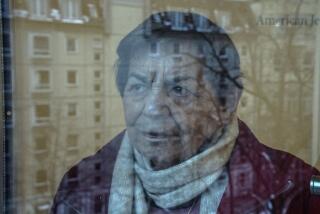Jewish Refugees in Shanghai
- Share via
Vividly and with much human detail, reporter Henry Chu’s “Shanghai’s Jews Live to Tell Story at Last” (July 15) described the wartime refuge that saved some 20,000 Central European Jews from almost certain extermination by the Nazis. He told the story with empathy and a keen eye for a good quote. However, those of us who lived through that experience will challenge some of his conclusions.
Most troubling is the theory that Shanghailanders needed half a century to overcome our guilt at having survived the Holocaust before we could start to talk about our wartime refuge. Perhaps a few of us were indeed hobbled by guilt feelings. The overwhelming majority of us, however, on arriving in this our new home country--and the largest contingent of Shanghai refugees came to the U.S.--had to concentrate on mastering the language and a different social and economic system, and often a new occupation. Until recently, few of us could afford the luxury of a deep retrospective look at our wartime refuge.
The assertion that “food and dignity were scarce” is half wrong. Food indeed was scarce for most, but dignity was plentiful. Not the external trappings of dignity; those had to be shed early. But there was dignity that came out of the daily struggle for survival, out of learning to do unfamiliar and ill-paid work in a hard environment, out of the brilliantly successful process of educating thousands of children although schoolbooks were mostly lacking, and out of the creation of significant works of art under great adversity.
Your editorial (July 17) issued a welcome reminder that the Shanghai refugees’ troubles and triumphs are part of the Jewish experience and deserve to be recorded.
Every former refugee should take all Shanghai-related materials out of the desk, shoe box or attic, and donate them to a major archive. Each such item can be, as your editorial’s headline put it, “a vital part of the mosaic,” but first it must be properly conserved and made accessible to researchers. In the words of Prof. Xu Buzeng, we are racing against time.
RALPH B. HIRSCH
Executive Director
Council on the Jewish Experience in Shanghai, Philadelphia


